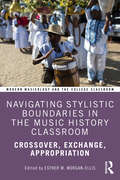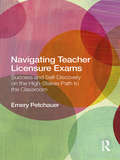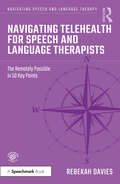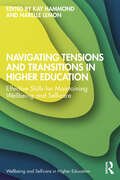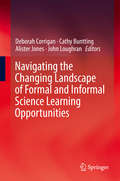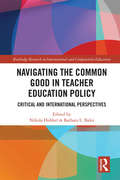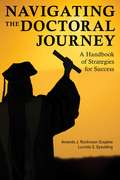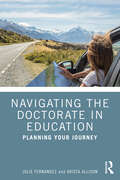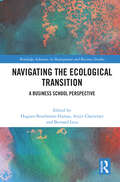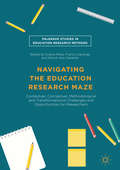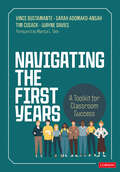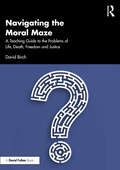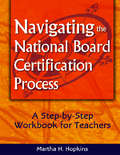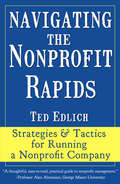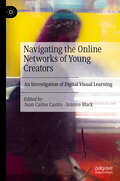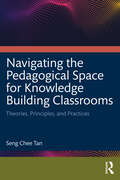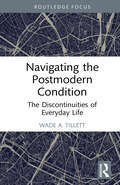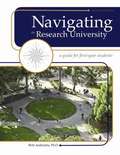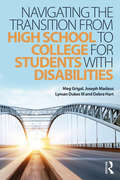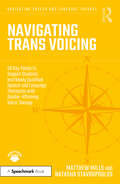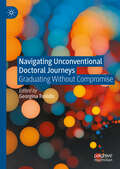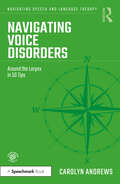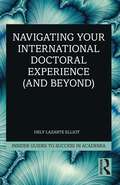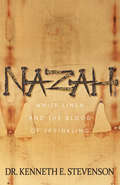- Table View
- List View
Navigating Stylistic Boundaries in the Music History Classroom: Crossover, Exchange, Appropriation (Modern Musicology and the College Classroom)
by Esther M. Morgan-EllisAt a time of transformation in the music history classroom and amid increasing calls to teach a global music history, Navigating Stylistic Boundaries in the Music History Classroom adds nuance to the teaching of varied musical traditions by examining the places where they intersect and the issues of musical exchange and appropriation that these intersections raise. Troubling traditional boundaries of genre and style, this collection of essays helps instructors to denaturalize the framework of Western art music and invite students to engage with other traditions—vernacular, popular, and non-Western—on their own terms.The book draws together contributions by a wide range of active scholars and educators to investigate the teaching of music history around cases of stylistic borders, exploring the places where different practices of music and values intersect. Each chapter in this collection considers a specific case in which an artist or community engages in what might be termed musical crossover, exchange, or appropriation and delves deeper into these concepts to explore questions of how musical meaning changes in moving across worlds of practice. Addressing works that are already widely taught but presenting new ways to understand and interpret them, this volume enables instructors to enrich the perspectives on music history that they present and to take on the challenge of teaching a more global music history without flattening the differences between traditions.
Navigating Teacher Licensure Exams: Success and Self-Discovery on the High-Stakes Path to the Classroom
by Emery PetchauerNavigating Teacher Licensure Exams offers practical, empirically sourced insights into the high-stakes licensure exams required in most states for teacher certification. This unique resource foregrounds the experiences of diverse preservice teachers, including teachers of color, to understand how they organize their preparation efforts, overcome self-doubt and anxiety, and navigate the high-pressure space of this important testing event. By situating these exams within their social and psychological contexts, presenting real-life cases of success and failure, and confronting innate perceptions of standardized tests, this book provides essential and highly practical support for preservice teachers, teacher educators, and departmental resource libraries.
Navigating Telehealth for Speech and Language Therapists: The Remotely Possible in 50 Key Points (Navigating Speech and Language Therapy)
by Rebekah DaviesThere is so much to consider in any clinical consultation: identifying the individual is the one you expected, who is with the individual, which therapy intervention, resources, signposting, referrals, being cued in to responses for contextual information, evaluation and outcomes, planning next steps … and this is all before you throw ‘virtual’ in the mix! This clinical companion presents 50 transferable, adaptable, practical and accessible chapters for speech and language therapists and others working via remote consultations. Divided into four sections, the book covers: The remote practitioner. The remote rules. Creating a digital tool kit. A remotely possible future. Aimed at students encountering their first remote consultations, newly qualified clinicians with limited practical experience of virtual clinics through to clinicians who are experienced in their own specialities but now need to transfer those skills to remote ways of delivery, this concise text will provide confidence and guidance for the reader. It will also prove useful to clinicians beyond speech and language as many of the skills and practical advice and guidance are applicable in specialities across a range of settings, both public and private, healthcare and education.
Navigating Tensions and Transitions in Higher Education: Effective Skills for Maintaining Wellbeing and Self-care (Wellbeing and Self-care in Higher Education)
by Kay Hammond Narelle LemonWith a focus on skills development, this book provides guidance on how to navigate transitions between career stages in higher education and how to maintain wellbeing in the process.In a fast-paced and ever-changing environment, a career path in higher education can demand rapid transition. This book provides comprehensive coverage of the kinds of transitions one may face in higher education and how to navigate them successfully while focusing on wellbeing and self-care. Centred around first-person accounts, the chapters illustrate the key issues around transitions and their impacts and provide suggestions for how to adapt through self-care. The authors offer insights from their own personal experiences, enabling the reader to develop an action plan of their own or to share with and guide students and early career mentees. The tools and strategies outlined in the book make up a library of resources that can be called upon at any stage of the journey.Written with all career stages in mind, this book will be an essential resource for new and experienced researchers alike.
Navigating the Changing Landscape of Formal and Informal Science Learning Opportunities
by Deborah Corrigan Cathy Buntting Alister Jones John LoughranThis book presents research involving learning opportunities that are afforded to learners of science when the focus is on linking the formal and informal science education sectors. It uses the metaphor of a "landscape" as it emphasises how the authors see the possible movement within a landscape that is inclusive of formal, informal and free-choice opportunities. The book explores opportunities to change formal school science education via perspectives and achievements from the informal and free-choice science education sector within the wider lifelong, life-wide education landscape. Additionally it explores how science learning that occurs in a more inclusive landscape can demonstrate the potential power of these opportunities to address issues of relevance and engagement that currently plague the learning of science in school settings. Combining specific contexts, case studies and more general examples, the book examines the science learning landscapes by means of the lens of an ecosystem and the case of the Synergies longitudinal research project. It explores the relationships between school and museum, and relates the lessons learned through encounters with a narwhal. It discusses science communication, school-community partnerships, socioscientific issues, outreach education, digital platforms and the notion of a learning ecology.
Navigating the Common Good in Teacher Education Policy: Critical and International Perspectives (Routledge Research in International and Comparative Education)
by Nikola Hobbel Barbara L. BalesNavigating the Common Good in Teacher Education Policy examines the changing relationships between the state and the common (or public) good. Using teacher education policy as the frame of analysis, the authors examine history, cultural context, and lived experiences in 12 countries and the European Union to explicate which notions of justice, social inclusion and exclusion, and citizenship emerge. By situating teacher education policy within a larger philosophical framework regarding the relationship between the state and conceptions of the "common good," this book analyzes the ideological and political desires of the state---how the state understands the common good, the future of national identity, and to what end schooling is imagined.
Navigating the Doctoral Journey: A Handbook of Strategies for Success
by Amanda J. Rockinson-Szapkiw Lucinda S. SpauldingThis book provides doctoral candidates with a practical, cross-discipline handbook for successfully navigating the doctoral process – from initial program selection to the final dissertation defense and preparing for the faculty interview. Invited chapters from established higher education experts cover topics ranging from university and program selection, preparing for comprehensive exams and dissertation research, self-care and self-management strategies, and recommendations for maintaining personal and professional support systems. Each chapter includes strategies for success and practical tips, including how to create a study guide for the comprehensive examination, how to create a professional support group, how to talk to your family about the doctoral process, how to select and work with a chair and committee, how to identify an appropriate research design, how to navigate the IRB process, and how to master the research and writing process.
Navigating the Doctorate in Education: Planning Your Journey
by Julie Fernandez Krista AllisonNavigating the Doctorate in Education is an engaging and honest conversation for anyone considering pursuing a doctorate degree in education. This book helps prospective students navigate the journey from choosing the right university to completing the research and achieving the ultimate title of doctor of education. Success in this advanced degree journey depends on understanding where to go; financial, personal, and professional demands; and the educational expectations of a doctorate degree. There are nuances of the process, whether you take classes on campus or online, that every candidate should know before beginning this terminal degree. A timely text, Navigating the Doctorate in Education encapsulates perspectives from professors and former doctoral candidates so you will be informed and prepared for success.
Navigating the Ecological Transition: A Business School Perspective (Routledge Advances in Management and Business Studies)
by Hugues Bouthinon-Dumas Arijit Chatterjee Bernard LecaThe transition towards sustainability is now a major issue that has taken centre stage in public debate, policy circles, scientific forums, and business roundtables. Higher education institutions focusing on educating tomorrow’s managers and leaders and on business practices are doubly challenged by this development. On the one hand, they must be accountable to their internal stakeholders who strongly identify with the new “environmental awakening”. On the other hand, because of their status as research institutions, they must provide answers and propose solutions to face this challenge which is shaping up to be the most crucial issue that humanity has had to face in the modern era.In this book, faculty and researchers from École Supérieure de Sciences Économiques et Commerciales (ESSEC Business School), a recognized leader among European schools of business and management, provide a multi-faceted perspective on the different areas that need to be considered to understand the new market dynamics during this environmental and social transition. The book identifies the obstacles that come in the way of the transformation of dominant business models, and how to overcome them in order to move away from “business as usual”. The various chapters in this work offer a vast diversity of approaches that address the paradigm shift towards sustainability, providing insights for both business and higher education. The book includes chapters from seven different departments at ESSEC: Management; Accounting and Management Control; Economics; Information Systems; Decision Sciences and Statistics; Marketing; Operations Management; and Public and Private Policy.Research-based and combining theory with practice, this thought-provoking book will be welcomed by academics, institutions, and professionals alike, wishing to gain perspectives on the challenges of the transition towards a sustainable society.
Navigating the Education Research Maze
by Dolene Rossi Francis Gacenga Patrick Alan DanaherThis book depicts rigorous and vigorous accounts of strategies used successfully by researchers to negotiate their way through the research maze. The metaphor of the maze evokes several different and sometimes contradictory elements of contemporary education research, including complexity, confusion, messiness, multiplicity and risk. While these are not necessarily or wholly negative attributes, it is important for researchers to be able to articulate and implement effective strategies for engaging wholeheartedly with these situations to navigate the education research maze. The book is structured around three main themes; politics, ethics, philosophies and theories of education research mazes; mazes in and with specific research methods; and mazes in and with specific research tasks and technologies. Each account develops broader lessons for enhancing the impact, quality, relevance and significance of research in other disciplines as well as education.
Navigating the First Years: A Toolkit for Classroom Success
by Vince Bustamante Timothy Cusack Wayne Davies Sarah Adomako-AnsahStart your teaching journey with your best foot forward Within your classroom walls, seeds of curiosity, creativity, and resilience are sown, and your impact will ripple far beyond and into the future with each lesson you teach and every heart you touch. As you embark on your teaching journey, let this book be your guide. Written by experienced teachers and mentors, Navigating the First Years provides new teachers with tried-and-true strategies, resources, and personal stories to support you in your first years. Presented in an accessible and approachable format, Navigating the First Years explores: Equity and Culturally Responsive Practices Well-Being and Balance The First Days of Teaching Planning and Lesson Design Instructional Practices The Learning Environment Assessment Practices By supporting new teachers in these critical areas, Navigating the First Years empowers you to create dynamic learning environments that inspire curiosity, promote critical thinking, and prepare students for success in an increasingly complex and interconnected world.
Navigating the First Years: A Toolkit for Classroom Success
by Vince Bustamante Timothy Cusack Wayne Davies Sarah Adomako-AnsahStart your teaching journey with your best foot forward Within your classroom walls, seeds of curiosity, creativity, and resilience are sown, and your impact will ripple far beyond and into the future with each lesson you teach and every heart you touch. As you embark on your teaching journey, let this book be your guide. Written by experienced teachers and mentors, Navigating the First Years provides new teachers with tried-and-true strategies, resources, and personal stories to support you in your first years. Presented in an accessible and approachable format, Navigating the First Years explores: Equity and Culturally Responsive Practices Well-Being and Balance The First Days of Teaching Planning and Lesson Design Instructional Practices The Learning Environment Assessment Practices By supporting new teachers in these critical areas, Navigating the First Years empowers you to create dynamic learning environments that inspire curiosity, promote critical thinking, and prepare students for success in an increasingly complex and interconnected world.
Navigating the Moral Maze: A Teaching Guide to the Problems of Life, Death, Freedom and Justice
by David BirchNavigating the Moral Maze is a teaching resource to help students understand and critically engage with the most pressing issues in the world today. From the ruin of Gaza to the climate emergency, from the repeal of Roe v Wade to rising inequality, young people are growing up in a world beset with moral concerns and predicaments. With this book teachers can equip students with the critical skills and conceptual clarity needed to navigate through these issues and reach a clear and articulate understanding of their own views.Each chapter features numerous lesson ideas with activities, texts and thought experiments that help refine and enrich students' thoughts on the topics while promoting discussion and reflection. Topics covered include: Reproduction Euthanasia Poverty Environment Borders War Applicable to Religious Studies, Philosophy and Ethics, and touching on topics relevant to PSHE, History and Geography, this will be a valuable resource for secondary teachers wanting to enhance their students' critical writing and thinking skills.
Navigating the National Board Certification Process: A Step-by-Step Workbook for Teachers
by Dr Martha H. HopkinsFilled with activities, checklists, and other practical tools, this comprehensive resource leads teachers through each stage of the certification process.
Navigating the Nonprofit Rapids: Strategies & Tactics for Running a Nonprofit Company
by Ted EdlichAre you looking to make a real difference in your community? Are you in academia looking for a textbook for teaching students who are studying nonprofit leadership? Do you have a passion to bring about change that will benefit others? Are you looking for a way to harness that passion and give it some organizational muscle and backbone? Are you on the hunt for a career you love, not just work that pays the bills? Are you involved in a nonprofit that is not living up to its potential? Then this book is for you! Discover the lessons of great nonprofit leadership that will sharpen your vision, give it structure that works, and make it a force to be reckoned with. You'll be excited and inspired by those like yourself who have done extraordinary work. With Navigating the Nonprofit Rapids, you'll discover lessons that have immediate application, and that making a difference is the real adventure of a lifetime.
Navigating the Online Networks of Young Creators: An Investigation of Digital Visual Learning
by Juan Carlos Castro Joanna BlackThis volume examines how young creators learn, create, and share their visual art online. Drawing from a robust set of case studies gathered locally, nationally, and internationally over three years with young adults 16-24, this work comes together as a crucial resource for understanding the evolving landscape of online art creation and dissemination by young people. The influence of social media is central to this exploration of the continuous cycle of producing, circulating, and consuming of digital images, here designated as digital visual learning networks (DVLN). As technology remains an inherent part of daily activities, contributions provide insights into how young creators harness tools to learn, innovate, and share.
Navigating the Pedagogical Space for Knowledge Building Classrooms: Theories, Principles, and Practices
by Seng Chee TanShowcasing the design and implementation of knowledge building pedagogy, this book for educators and education researchers illuminates this future-oriented instructional and learning approach. In this Knowledge Age, innovation and creative knowledge works are central to the progress of a society; increasing the productivity of knowledge workers remains the main priority of competitive societies. Consequently, developing knowledge building capacity among students becomes one main goal of education. Knowledge building aims to transform school education in a radical way by developing the culture of innovation and knowledge creation in classrooms, from preschools to universities. Knowledge building pedagogy focuses on sustaining idea improvement among students, who develop the collective cognitive responsibility to add value to the learning community. Developed since the 1990s, knowledge building is now a model of instructions researched and advanced with an international network of researchers, teachers, educators, engineers, and policymakers. Implementing the knowledge building approach requires educators to make decisions based on principles, rather than following prescriptive procedures that characterized most instructional models. Tan highlights the key pedagogical principles and discusses the critical design considerations. He also identifies the emerging research directions and developmental works related to knowledge building. A must-read book for educators and education researchers who are interested in the design and implementation of knowledge building pedagogy.
Navigating the Postmodern Condition: The Discontinuities of Everyday Life
by Wade A. TillettDrawing on poststructuralist frameworks, this book examines the way to a radical acceptance of daily discontinuities and difference as it allows us to embrace life in the postmodern world.With each chapter exploring the human relationship with a disjunction in daily life, such as sleeping, forgetting, and multitasking, the author examines overlooked aspects of daily living as fresh data from which to analyze our condition. A phenomenological study of postmodern life, the book provides anecdotes of what it is like to live through these gaps and theorizes how we use these gaps. Using an arts-based methodology, the author also allows the work to mirror the discontinuities which it describes, interrupting the assumption of our lives as continuous and unitary in both form and content. Addressing the vast jumble of contradictions that is our daily experience in this contemporary world, it offers explanation through theory and anecdote and illustrates the path toward radical acceptance, which allows us to see ourselves as beautifully composed of fractures, gaps, and overflow. It will appeal to scholars, researchers, and postgraduate students with interests in poststructuralism, curriculum theory, and art-based research methods.
Navigating the Research University: A Guide for First-year Students (2nd Edition)
by Britt AndreattaFull of practical tips and tools, and useful personal advice, Navigating The Research University: A Guide For First-Year Students, Second Edition, provides first-year students with a comprehensive introduction to education at a research institution. The text is designed to support students at a broad range of research universities by helping them understand what research is, the role it plays in the university, and the basic methodologies used in a variety of disciplines. Andreatta guides students to develop essential skills for academic success, including critical thinking, thoughtful analysis, and effective writing. In addition, the text includes valuable insights into the personal and working issues students may encounter as new and aspiring members of a community of scholars.
Navigating the Transition from High School to College for Students with Disabilities
by Meg Grigal Joseph Madaus Lyman L. Dukes III Debra HartNavigating the Transition from High School to College for Students with Disabilities provides effective strategies for navigating the transition process from high school into college for students with a wide range of disabilities. As students with disabilities attend two and four-year colleges in increasing numbers and through expanding access opportunities, challenges remain in helping these students and their families prepare for and successfully transition into higher education. Professionals and families supporting transition activities are often unaware of today’s new and rapidly developing options for postsecondary education. This practical guide offers user-friendly resources, including vignettes, research summaries, and hands-on activities that can be easily implemented in the classroom and in the community and that facilitate strong collaboration between schools and families. Preparation issues such as financial aid, applying for college, and other long-term planning areas are addressed in detail. An accompanying student resource section offers materials for high school students with disabilities that secondary educators, counselors, and transition personnel can use to facilitate exploration and planning discussions. Framing higher education as a possible transition goal for all students with disabilities, Navigating the Transition from High School to College for Students with Disabilities supports the postsecondary interests of more than four million public school students with disabilities.
Navigating Trans Voicing: 50 Key Points to Support Students and Newly Qualified Speech and Language Therapists with Gender-Affirming Voice Therapy (Navigating Speech and Language Therapy)
by Matthew Mills Natasha StavropoulosThis book is a resource for those new to the field of trans voicing. It summarises 50 key points needed to work collaboratively and effectively with trans and non-binary people, covering sections on: Trans cultural knowledge, sensitivity and awareness Vocal pedagogy and the therapeutic relationship Fundamental know-how and voice therapy principles and exercises in trans voicing Written and developed by both a leading consultant speech and language therapist in trans voicing, and a psychologist and counsellor from the trans community, the book centres a unique collaboration of clinical and lived experience expertise and is deeply trans-affirmative in approach.
Navigating Unconventional Doctoral Journeys: Graduating Without Compromise
by Georgina TsolidisThis edited book delves into the experiences of a group of women who, as mature aged students, took on doctoral studies, persevered and succeeded. Drawing on their own experiences, the group of women from varied backgrounds consider, with hindsight, what prompted them to begin doctoral studies, what hurdles they faced, the strategies that supported their completions and how their doctoral success influenced their future journeys. The editor of the collection, Georgina Tsolidis, was their supervisor. The chapter authors, Stella Coram, Annabelle Leve, Melinda McPherson and Vikki Pollard, explore their motivation to enter doctoral study in turn. These case studies contribute to an overarching analysis of why women who are classified as mature aged students and have child rearing, work and other commitments choose to undertake such a challenging academic journey. The book will be of interest to researchers and postgraduate students of higher education, sociology of education and gender studies.
Navigating Voice Disorders: Around the Larynx in 50 Tips (Navigating Speech and Language Therapy)
by Carolyn AndrewsThis book comprises 50 tips for speech and language therapy practitioners who are new to, or less experienced in, working with adult voice disorders. It considers the full clinical pathway from assessment to management and on through to discharge. Packed with easily accessible, practical hints about therapy and useful self-development activities for the reader, sections cover: • Reflecting on the normal voice • ‘Doing’ therapy • Assessment • Management • Specific diagnoses • Professional voice users • Professional liason • Learning from clients The resource concludes with a handy appendix providing further reading and useful resources. Presenting diagnosis-specific and client group-specific tips alongside widely applicable guidance, this is a go-to book for accessible and practical support for voice newbies.
Navigating Your International Doctoral Experience (Insider Guides to Success in Academia)
by Dely Lazarte ElliotFocused on understanding the journey of international doctoral and early career scholars, this key book provides insight and guidance for those whose country of origin differs from where they have chosen to pursue a doctorate. Drawing on the experiences of PhD students, it harnesses invaluable insights to support a deepening appreciation of a chosen subject of study, manage research and make the most of what intercultural interactions can offer within a doctoral experience. Each carefully considered part uses research-informed evidence drawn from a wide range of experiences and observations, providing various, and at times contrasting, perspectives. This book has been written to: Offer new insights into the PhD abroad experience Equip international scholars for their doctoral journey Help the reader optimise institutional support with help from supervisors and other staff members Filled with evidence-informed suggestions and advice, this book offers support to doctoral scholars and early career researchers as they navigate their international doctoral journey. The ‘Insider Guides to Success in Academia’ offers support and practical advice to doctoral students and early-career researchers. Covering the topics that really matter, but which often get overlooked, this indispensable series provides practical and realistic guidance to address many of the needs and challenges of trying to operate, and remain, in academia. These neat pocket guides fill specific and significant gaps in current literature. Each book offers insider perspectives on the often implicit rules of the game – the things you need to know but usually aren’t told by institutional postgraduate support, researcher development units, or supervisors – and will address a practical topic that is key to career progression. They are essential reading for doctoral students, early-career researchers, supervisors, mentors, or anyone looking to launch or maintain their career in academia.
NAZAH: White Linen and the Blood of Sprinkling
by Dr. Kenneth E. StevensonAs an original team member of STURP (The Shroud of Turin Research Project, Inc.) who were given the rare opportunity to intricately examine and test the shroud, Dr. Kenneth Stevenson brings forth his fourth treatise on the subject with intriguing new perspective.NAZAH offers an outlook on the Shroud of Turin that looks at both the vast amount of clear, scientific research and evidence, and the heart of the Holy Scriptures. Joined with historical fact, prophetic confirmation, Judaic burial customs and personal reflection, the mystery of the shroud of a crucified Jewish man, whose image was left to be seen, is now brought forth to inspire and challenge a new generation of truth seekers. With additional discussions of the relic’s historical and spiritual significance, NAZAH will touch the hearts of not only those of Jewish faith, but the hearts of people of all faiths who seek deeper meaning as to what the Shroud of Turin means to today’s generation.
